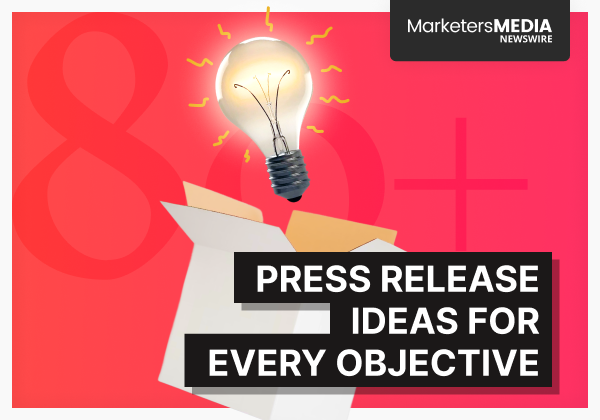Table of Content
- Crafting a Professional Introduction
- Importance of Storytelling
- Aligning with Company Needs
- Differentiating Yourself
- Structuring Your Answer Effectively
- Tailoring Your Response for Different Audiences
- Highlighting Relevant Strengths and Experiences
- The Do's and Don'ts of Crafting Your Response
- Relating Your Answer to the Job at Hand
- Final Remarks
- Frequently Asked Questions
When someone asks you, "Tell me about yourself," do you freeze up like a popsicle on a winter's day or confidently dive into your life story? It can feel like walking a tightrope between sharing too little and oversharing. But fear not, finding the balance is key to leaving a lasting impression. Whether you're the master of succinct self-introductions or tend to ramble on, this post will equip you with tips to craft an engaging and memorable response that showcases your personality without giving away your entire autobiography.
Crafting a Professional Introduction
Tailoring Response

When asked to tell me about yourself, it's crucial to tailor your answer to the job requirements. Highlight skills and experiences that directly match the job description. For example, if the role requires strong leadership abilities, share instances where you successfully led teams or projects.
Customize your response based on the company's values and culture. If the organization prioritizes innovation, mention any innovative projects you've spearheaded in previous roles. Aligning your response with what the employer is seeking shows that you understand their needs and can fulfill them effectively.
- Customize answer to align with job requirements
- Highlight relevant skills and experiences
- Tailor response based on company's values
Positive Impression
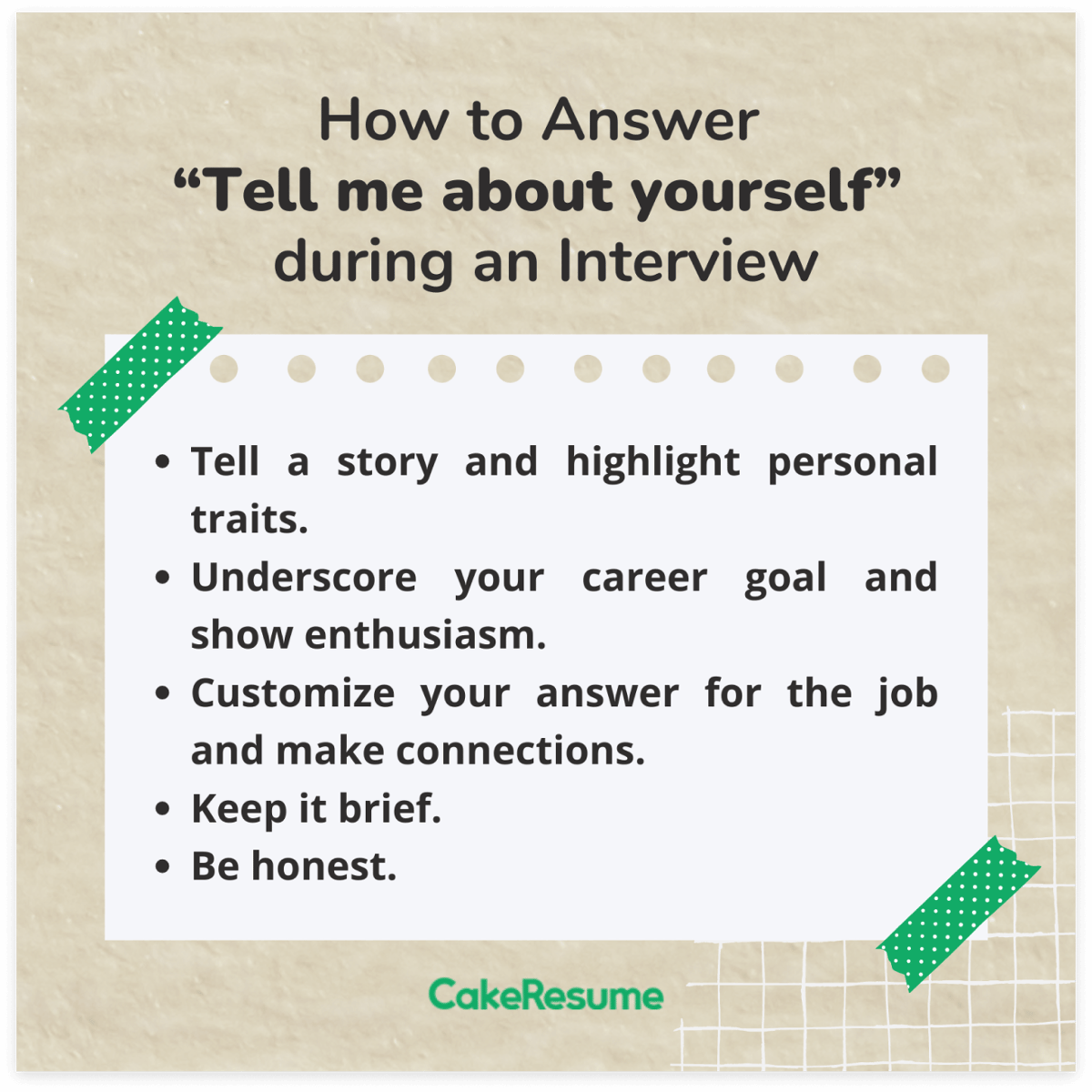
To make a positive impression when answering tell me about yourself, showcase enthusiasm and confidence. Use positive language and tone to convey your passion for the role you are applying for. Express genuine interest in both the position and the company by demonstrating knowledge of their mission.
By exuding enthusiasm during your introduction, you create an engaging atmosphere that captivates potential employers' attention from the start. Confidence in discussing your background and accomplishments helps establish credibility as a competent candidate worth considering for the position.
- Make strong first impression with enthusiasm
- Use positive language to convey passion
- Demonstrate genuine interest in company
Structuring Answer

Begin by providing a brief overview of yourself when responding to the "tell me about yourself" question. Share details about your background, such as education or current position, setting a foundation for further discussion. Focus on key achievements relevant to the job at hand while highlighting specific experiences that showcase applicable skills.
As you conclude your introduction, summarize how these skills make you an ideal fit for this particular role within their organization. By structuring your answer this way, you create a coherent narrative that presents you as a valuable asset who meets their needs effectively.
- Start with brief introduction about yourself
- Focus on key achievements relevant to job
- Conclude by summarizing how skills make ideal fit
Importance of Storytelling
Engaging Audience
![Learn How Storytelling Can Elevate Your Content Marketing [eBook]](https://media.licdn.com/dms/image/D4D08AQG1xHLXbUJzKA/croft-frontend-shrinkToFit1024/0/1632508627448?e=2147483647&v=beta&t=iDcQwkBvezxI5ns299szFBJ4pOdQ0WLXwZ93WyMr1s0)
Storytelling is a powerful tool to capture the attention of your audience, especially during interviews. By incorporating anecdotes or examples into your responses, you can showcase your skills effectively. For instance, instead of merely stating that you are a team player, recount a specific situation where your collaborative efforts led to success.
Asking thought-provoking questions is another way to engage the interviewer in meaningful dialogue. This approach not only demonstrates your interest in the role but also allows for a more dynamic exchange. By posing questions related to the company's future projects or challenges, you show initiative and critical thinking skills.
Personal Journey

Sharing a brief overview of your career progression can provide valuable insight into your professional growth. Highlighting significant milestones or challenges that have influenced your journey helps create a compelling narrative about who you are as a professional. For example, discussing how overcoming a major setback shaped your resilience and problem-solving abilities adds depth to your story.
Emphasizing how these experiences have equipped you for the current role is crucial when narrating your personal journey. By connecting past challenges or successes to the requirements of the position, you demonstrate alignment between your background and what the job demands.
Aligning with Company Needs
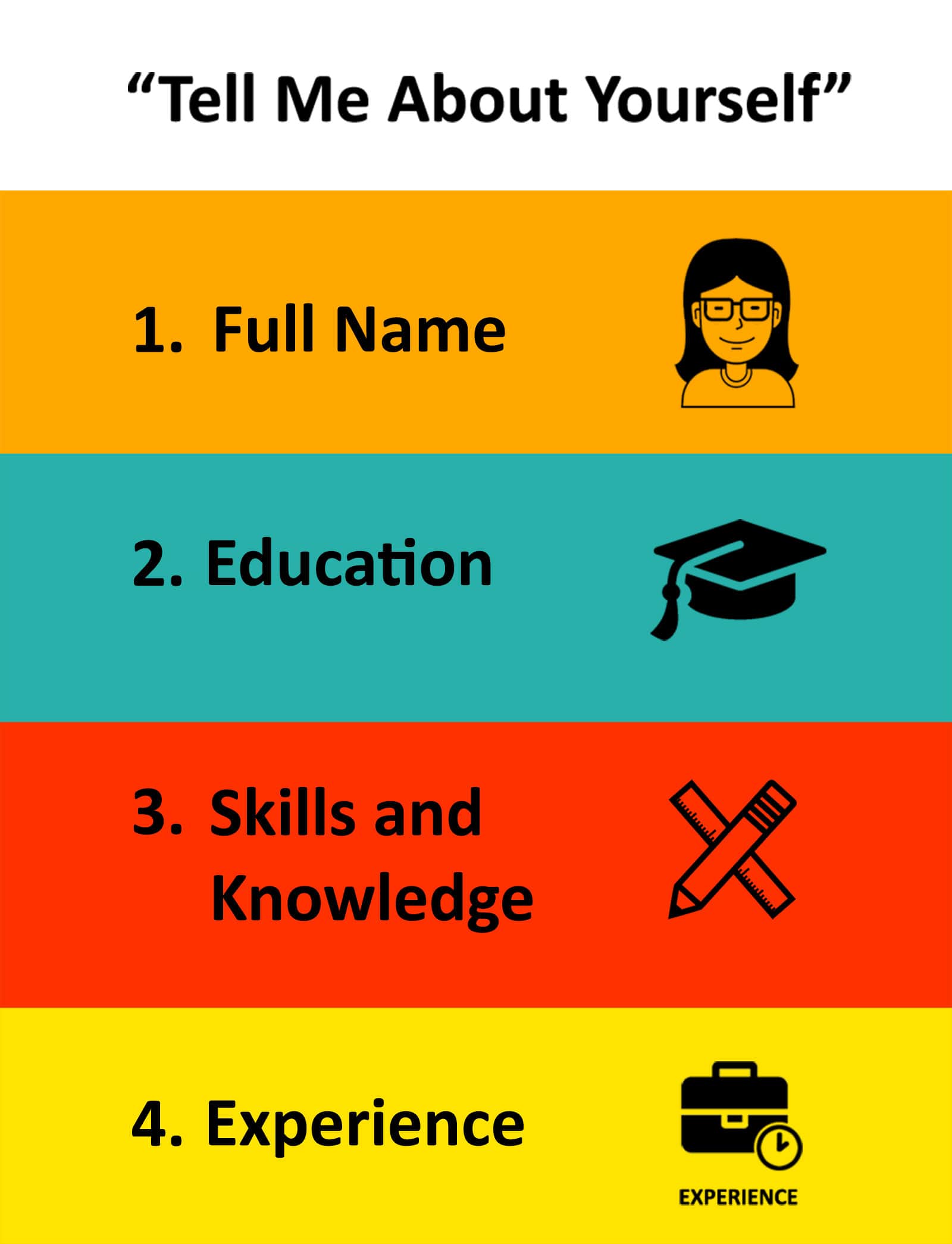
When asked to tell me about yourself, it's crucial to align your response with the company's needs. Highlight your core strengths that match the job requirements. For instance, if you're applying for a leadership role, emphasize your strong communication and decision-making skills.
Provide specific examples of how these strengths have led to success in previous roles. Maybe mention a time when your problem-solving abilities helped streamline processes or improve team efficiency. By connecting these anecdotes to the job you're interviewing for, you demonstrate how valuable your skills can be to the organization.
Discuss relevant experiences that directly tie into the position you're pursuing. Whether it's through specific projects, previous roles, or responsibilities you've held, make sure they showcase skills essential for this job. Explain how these experiences have equipped you with the necessary tools and knowledge to excel in this new role.
Differentiating Yourself

Showcasing your unique qualities is crucial. Highlight any specialized training, certifications, or talents that make you stand out from other candidates. These distinctive attributes can demonstrate how you can bring exceptional value to the organization.
Crafting a compelling elevator pitch is essential in differentiating yourself effectively. This succinct summary of your professional background should focus on key achievements, skills, and goals. Tailor this pitch to align seamlessly with the job requirements and the company's culture for maximum impact.
In essence, when asked "tell me about yourself," emphasizing your unique qualities and presenting a tailored elevator pitch are vital components in setting yourself apart from other candidates and leaving a lasting impression on potential employers.
Structuring Your Answer Effectively
Three Parts Division
When asked "tell me about yourself," divide your response into three parts: introduction, experience, and relevance. This structured approach ensures a clear and organized answer. Keep each part concise to highlight key information effectively. Start with a brief personal introduction, then move on to your relevant experiences.
To structure the response efficiently, imagine you are telling a story in three distinct chapters. Begin by introducing yourself briefly - mention your name and current position or academic background. Transition smoothly into sharing your work experience or educational journey succinctly.
Empathy Exercise
Put yourself in the interviewer's shoes when crafting your response to "tell me about yourself." Understand their perspective and anticipate what they want to hear from you. Tailor your answer accordingly by addressing their needs directly.
Show empathy during this exercise by demonstrating how you can fulfill the requirements of the role or organization based on what you believe they are seeking in an ideal candidate. By aligning your response with the interviewer's expectations, you showcase not only self-awareness but also an understanding of their goals.
Tailoring Your Response for Different Audiences
Audience Analysis
When preparing to answer the question "tell me about yourself," conducting audience analysis is crucial. Researching the company and its values helps you understand the interviewer's perspective. By analyzing the job description, you can pinpoint the qualities they are seeking in a candidate. Customizing your response based on this analysis enables you to tailor your answers to resonate with the interviewer.
Customizing Message To effectively engage your audience, personalize your response by tailoring it to fit both the specific role and organization. Addressing unique challenges or opportunities presented by the job showcases your understanding of their needs. Demonstrating how your skills and experiences align with what they are looking for enhances your chances of making a positive impression.
Highlighting Relevant Strengths and Experiences
Strengths Showcase
When discussing yourself, it's crucial to highlight your strengths with real examples. For instance, if you mention that you are detail-oriented, provide a specific accomplishment where this trait benefited your previous employer. Link these strengths to the job requirements by showing how they align with what the position demands. By doing so, you demonstrate not just what you can do but also how well-suited you are for the role.
To effectively showcase yourself, focus on achievements that illustrate your strengths in action. Suppose one of your key attributes is leadership skills; discuss a project where your leadership led to a successful outcome. This tangible evidence gives credibility to your claims and helps interviewers see the value you bring. Remember always to tailor these examples based on the specific needs of the job at hand.
Experience Relevance
When delving into your experience, emphasize those directly relevant to the position being discussed. If applying for a marketing role, talk about campaigns or strategies you've worked on previously. By drawing parallels between past experiences and current job requirements, you make it clear why you're suited for the role. Explain how these experiences have equipped you with skills and knowledge pertinent to excelling in this new opportunity.
Discuss projects or responsibilities from previous roles that align closely with what's expected in this new position; this shows continuity in your capabilities and expertise level within similar domains. By sharing concrete examples of how past experiences have prepared you for this role, hiring managers gain insight into how seamlessly you can transition into their team dynamics.
The Do's and Don'ts of Crafting Your Response
Essential Inclusions
When discussing tell me about yourself, ensure you include pertinent details like your educational background, certifications, or licenses. Highlight any significant awards or recognition you have received to showcase your accomplishments effectively. Mentioning volunteer work or extracurricular activities that demonstrate valuable skills can provide insight into your character.
For instance, if you are applying for a marketing position and have a certification in digital marketing from a reputable institution, this is essential information to share when asked to tell me about yourself. Similarly, if you received an award for outstanding performance at your previous job, including this detail can set you apart from other candidates. Moreover, discussing how volunteering at a local charity improved your teamwork skills can be beneficial.
Avoidable Elements
On the flip side, there are elements that should be avoided when crafting your response to tell me about yourself. Refrain from sharing personal or irrelevant information that does not contribute to showcasing why you are the right fit for the role. It's crucial to steer clear of discussing negative experiences or failures as these may raise red flags during an interview process.
For example, mentioning unrelated hobbies like gardening when interviewing for a finance position might not add value to your candidacy unless it directly ties back to the job requirements. Skipping over details that do not align with the job specifications is vital in keeping your response focused and tailored towards highlighting relevant strengths and experiences.
Relating Your Answer to the Job at Hand
When answering the "tell me about yourself" interview question, it's crucial to relate your response directly to the job you are applying for. Clearly articulate how your skills and experiences align with the job description provided by highlighting specific qualifications or achievements that make you a strong fit for the position. For example, if you are applying for a marketing role, focus on your successful campaign strategies in your current job.
Show enthusiasm for the role and explain how it aligns with your career goals. This demonstrates to the interviewer that you are genuinely interested in their organization and not just any job opportunity that comes along. Emphasize why this particular job excites you and how it fits into your long-term career plans. By doing so, you show that you have thoughtfully considered how this role can help advance your professional development.
Job Alignment
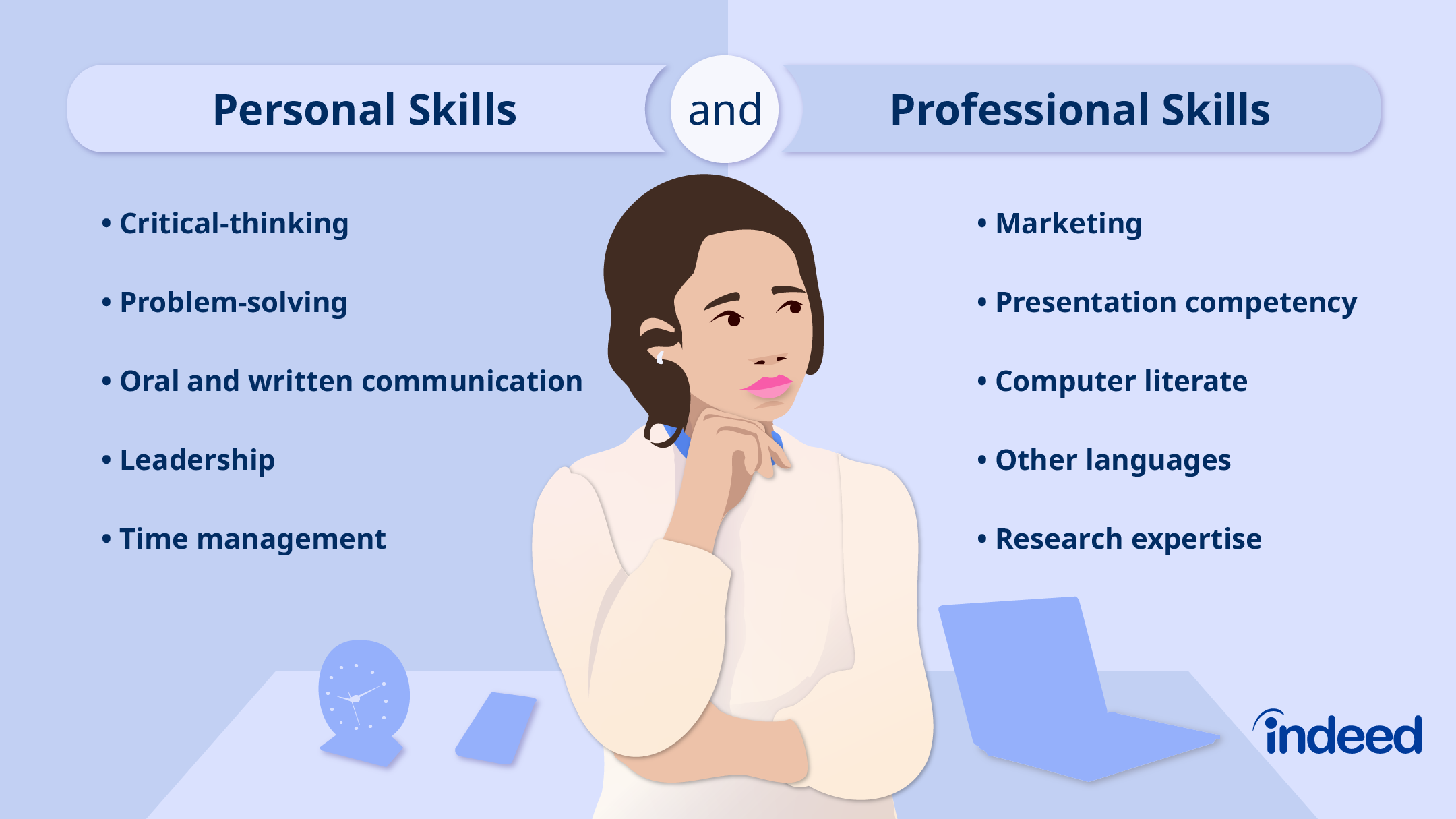
In an interview setting, connecting your answer to the company's mission is vital. Make sure to clearly demonstrate how your skills and experiences can contribute towards achieving their goals as outlined in their mission statement. Tailor examples from past roles where you made significant contributions aligned with what they seek in an ideal candidate.
When discussing alignment with the company's values, go beyond merely stating compatibility; provide concrete examples of situations where these values guided your actions positively at work before. This showcases not only understanding but also practical application of shared principles between yourself and potential employers.
Integrating Relevant Statistics into Your Professional Narrative
Understanding the dynamics of the job market and how personal branding impacts employment opportunities can significantly enhance how you position yourself in interviews. By incorporating relevant statistics into your self-introduction, you not only demonstrate your awareness of industry trends but also how you stand out as a candidate in a competitive landscape. Here are two pertinent statistics that can bolster your approach to crafting a memorable and impactful self-introduction:
- According to LinkedIn, candidates who articulate their personal brand in their introductions are 40% more likely to receive job offers. Personal branding encompasses your unique combination of skills, experiences, and personality that you bring to the table, which sets you apart from other candidates. Tailoring your introduction to highlight these elements, aligned with the job role and company culture, can significantly impact your interview success rate.
- A study by the National Association of Colleges and Employers (NACE) revealed that 91% of employers prefer candidates to have work experience, and 65% of them prefer this experience to be relevant. When crafting your self-introduction, emphasizing not just your experiences but specifically those that are relevant to the position you are applying for can dramatically increase your attractiveness as a candidate. This statistic underlines the importance of strategically selecting which aspects of your professional journey to share, ensuring they align with the job's requirements and the company's goals.
Leveraging Press Releases in Your Professional Strategy

Integrating press releases into your professional introduction is a strategic move that can significantly enhance your personal brand and set you apart in the job market. By mentioning your involvement in or the subject of press releases, you highlight your achievements and industry recognition, adding credibility and visibility to your narrative. This approach showcases your active contributions and alignment with industry trends, making your story not just about the roles you've held but the impact you've made.
Mentioning press releases in your introduction serves as a powerful testament to your professional standing and accomplishments, demonstrating to potential employers or contacts that you're a high-caliber candidate whose work is recognized and valued in your field. It's a nuanced way to weave in concrete examples of your successes and to underscore your active participation in shaping industry trends.
Final Remarks
You've now equipped yourself with the tools to craft a compelling response when asked, "Tell me about yourself." By mastering the art of storytelling, aligning with the company's needs, and highlighting your strengths effectively, you can differentiate yourself from other candidates. Remember to structure your answer thoughtfully, tailoring it to suit different audiences and emphasizing relevant experiences.
Now, it's time to put these strategies into practice. Take a moment to reflect on your unique story and the value you bring. Tailor your response for that dream job or opportunity waiting for you. Stand out by weaving your narrative seamlessly into the conversation, leaving a lasting impression on your interviewer. Your story is powerful—make sure they remember it.
Frequently Asked Questions
How important is it to craft a professional introduction?
Crafting a professional introduction sets the tone for your interaction. It's like a firm handshake - creates a lasting impression and shows you're prepared and confident.
Why is storytelling crucial in telling about yourself?
Storytelling captivates attention, making you memorable. Like narrating an exciting tale, weaving personal anecdotes into your introduction adds depth and relatability.
How can I align my self-introduction with company needs effectively?
Research the company culture and values to tailor your pitch accordingly. Show how your skills align with their requirements, demonstrating that you're the perfect fit for their team.
What are some ways to differentiate myself in my self-introduction?
Highlight unique experiences or skills that make you stand out. Just as every painting has its own brush strokes, showcasing what makes you special will leave a lasting impression.
Why is structuring my answer effectively essential when talking about myself?
A well-structured response ensures clarity and coherence. Think of it as building a sturdy house - each part contributes to the overall strength and impact of your message.
Free Press Release Template
Tell us where to send your PDF:
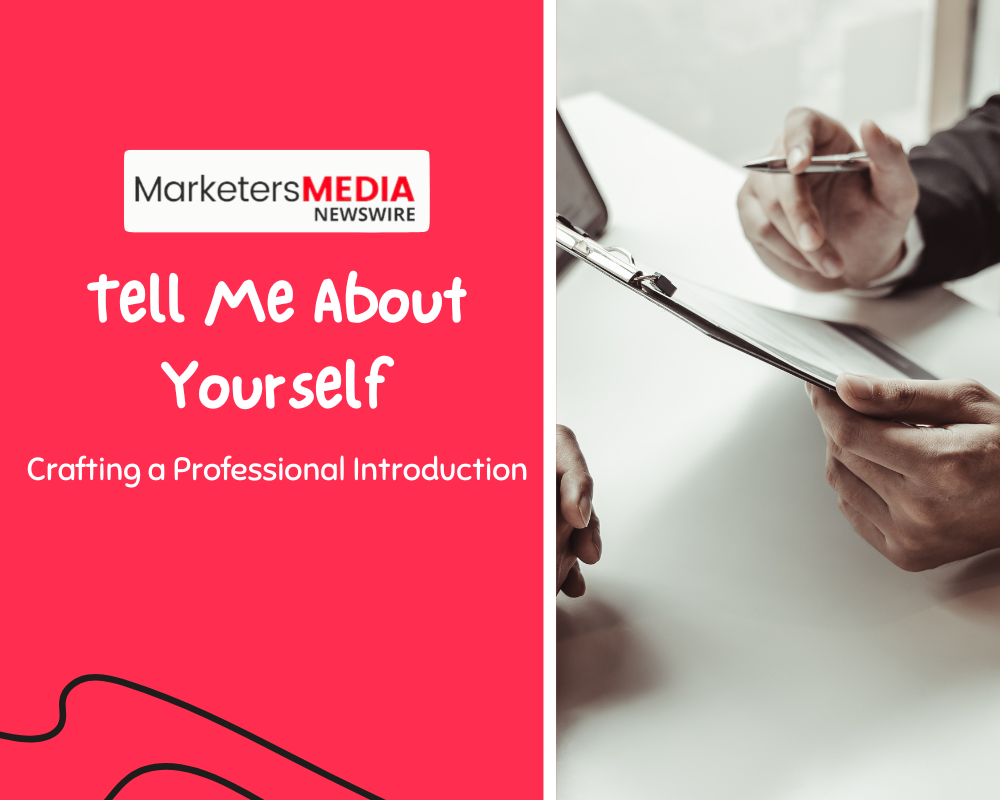



![24 Best Press Release Examples [For All Occasions]](https://marketersmedia.com/wp-content/uploads/2025/03/Press-Release-Examples-for-All-Occasions.png)

